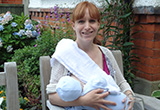 News of a new study published yesterday in Lancet Global Health, which shows that breast feeding is linked with higher IQ, was music to my ears. I am the mother of an eight month old, whom I am still breast feeding, and it was encouraging for me to hear that the many months of hard work have been worth the effort.
News of a new study published yesterday in Lancet Global Health, which shows that breast feeding is linked with higher IQ, was music to my ears. I am the mother of an eight month old, whom I am still breast feeding, and it was encouraging for me to hear that the many months of hard work have been worth the effort.
The Brazilian study looked at 3493 babies and found that those who had been breast fed for a year or more scored higher on IQ tests thirty years later. They also spent more years in education and had higher monthly incomes than babies who were breast fed for less than a month.
This study further supports current WHO advice that babies should be exclusively breast fed for the first six months. But what no one wants to tell you as an expectant or new mother is just how hard breast feeding is. I started to get some inkling of the challenge that lay ahead when I went to a breast feeding class a few weeks before my baby was due. The midwife gave us all a piece of paper with a clock on it and asked us to mark down on the clock face how many times during the day we have a bite to eat or a sip of a drink. “Mark down everything,” he said, “even a small sip of water.” As the clock face in front of me filled up with marks all around the clock, I began to realise that feeding was going to be an enormously time consuming task.
And indeed it was. Before I had a baby I could never have imagined the hours and hours of everyday that would be spent feeding. Days disappeared when I did little else. Plans to go out and do things were completely derailed by the need to sit and feed my baby. Sometimes even attempts to go for a short walk didn’t happen because by the time I was ready to go out, my baby was hungry again. And in the early weeks most of my meals were eaten with a baby attached to my breast.
Breast feeding is, obviously, entirely done by the mother. No one can help. Many fathers that I have spoken to say they felt redundant and helpless as their partners struggled to feed their baby, day and night. As I was increasingly sleep deprived, people offered to help, but ultimately there was nothing they could do. And even now, eight months down the line, it is still me who has to wake up multiple times a night to feed my baby. I can’t hand that over to anyone else, even just to get one night of sleep.
And despite the fact that I found breast feeding very hard, I’m also aware that I am very lucky because I didn’t encounter many problems with breast feeding. But many women do, and despite their best efforts, find it impossible to breast feed their child, even though they would dearly like to.
So whilst studies like this are encouraging, what mothers need is more support. I found there was a lot of support available to me at clinics, baby feeding groups, and from the NHS feeding team, but a thread on doc2doc suggests that this is not the case for everyone, and that many women were also confused by the contradicting advice they received.
Most importantly women shouldn’t be put under too much pressure. I was grateful to the midwife who gave my newborn baby formula whilst I slept on my first night in hospital. I had tried and failed to get him to breast feed and after a day of labour, I was too tired to keep trying. She could have left me with a hungry newborn and told me to keep trying, but actually by giving him formula, and letting us both get a few hours of sleep, it meant that we were both more rested and able to try breast feeding successfully in the morning.
When I visited various health visitor clinics and baby feeding groups during my maternity leave, I witnessed many distressed, tired, and demoralised women, many in floods of tears, talking to the health visitors and feeding advisers about the difficulty they were having with breast feeding. Almost always it felt as though the women were being told to persevere without someone really listening to how much they were struggling, or noticing their unhappiness.
Breast feeding is fantastic when it works and both mother and baby are happy. As shown by this recent study, the health benefits are evident, but don’t underestimate just how hard it is to do.
Juliet Dobson is web editor and blogs editor, The BMJ.
